Lofty Lushan Mountain
Temples in Hidden Places
On the First of August
Wheels by the Water
Share your travel story with regional@chinadaily.com.cn
Longhu Mountain (Dragon and Tiger Mountain)
( travelchinaguide.com, travelchinaguide.com )
Updated: 2011-08-29
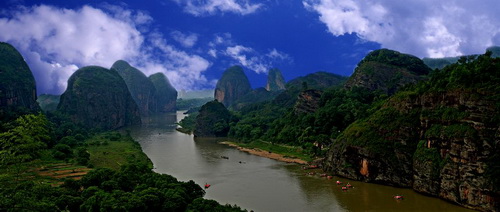 |
 |
| Longhu Mountain (Dragon and Tiger Mountain) |
|
|
The main scenic spots include Shangqing Palace, Yingtian Mountain, Mazu Cliff, Hongwu Lake, Fairy Water Cliff, and Longhu Maintain. The Taoism culture experiencing a very long history, beautiful and unique green hills with wandering streams and springs among them, and the mysterious cliff tombs that can not be explained by modern science are the three most amazing and attractive points among the natural and cultural sceneries in the resort.
Taoism of China originated in this place, Longhu Mountain. Longhu Mountain was formerly named Yunjin Mountain. In the middle of Eastern Han Dynasty (AD 25-220), Zhang Daoling, the first Heavenly Master ("a Taoist priest", the title used by Taoists for the Head of Taoism) settled down here and began to make Nine-sky Pills of Immortality. “A dragon and a tiger appeared when the Pills are made, so the Mountain was renamed as Longhu Mountain ("Long" and "Hu" in Chinese means dragon and tiger in English). The Title of Heavenly Master Zhang passed on for 63 generations, witnessing a Taoism sect which experienced the longest history of more than 1,900 years among all single-name sects of this religion. So there is an old saying in China, "Confucius represents the North while Heavenly Master Zhang the South."
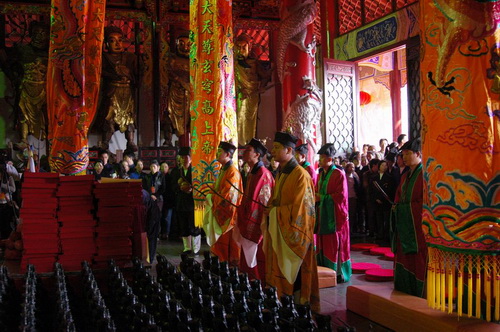 |
| Taoism of China originated in Longhu Mountain. |
Shangqing Palace in Shangqing Old Town scenic area, first built in the Eastern Han Dynasty, is the place for Tian Shi to pray and the place where all gods received their official ranks. It was as large as the royal palace, but one Chi (about 0.33 meter) lower to show the respect for the royal prerogative.
Apart from the sacred place for Taoism, Longhu Mountain is also full of beautiful and special landscapes. As a typical Danxia landform characterized by its cliffy scarp, the red terrestrial clastic rock can be seen everywhere in Celestial Water Rock scenic area. There are a total of 99 peaks, 24 boulders, 108 natural and artificial sights and over twenty wells, ponds, streams and waterfalls.
"Ten cannot" rocks in this area are famous for the vivid guise and attractive stories. They are: the nun carrying monk cannot pass by; the jade comb that cannot comb the hair; the water lily that cannot be wore; the test-sword stone that cannot be put to the test; the celestial peach that cannot be eaten; the stone drum that cannot be beat; the splendid silk that cannot be wrapped; the fairy cannot be married; the scoop that cannot be used and the Taoism Hall that people cannot sit in.
Sitting in a raft and drifting in the winding Luxi River which meanders westwards through the whole mountain area and links sights scattered along the banks, visitors can take in all the beautiful scenes, blue skies, white clouds, green water and red mountains.
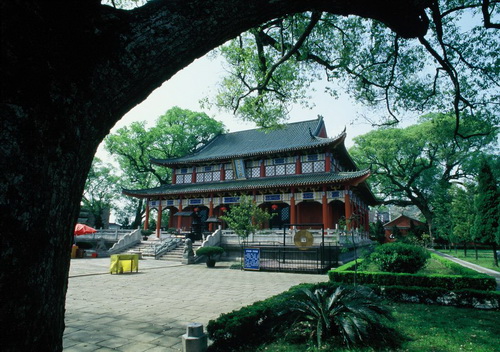 |
| The Heavenly Master's Maison |
Another marvelous sight in Longhu Mountain is the Cliff Tombs. Most of the tombs are about 50 meters above the water, and some are more than 300 meters high. Floating in the Luxi River, Cliff Tombs of the Spring and Autumn Period (770-476 BC) and the Warring States Period (476-221 BC) can be seen along the river banks. Because of its expansive area, large quantity, dangerous location and unique shape, the tombs got the title "the best natural archaeological museum of China". No one is quite sure why or how the ancient site was built, so it's still a mystery waiting for you to discover.
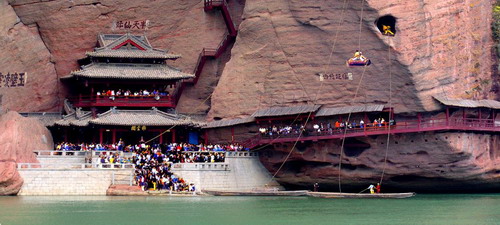 |
| Performance of lifting the cliff tombs |
With Yingtan-Xiamen, Anhui-Jiangxi, and Zhejiang-Jiangxi railways and 206, 320 national highways crossing this area, the traffic conditions are convenient here. Besides, you can take waterways to Poyang Lake, the biggest Transportation Center in the south of the Yangtze River. The Resort is only 120 km away from the Changbei Airport in Nanchang, the capital of Jiangxi province and 16 km from Yingtan, one can take No 8 bus in the city to reach here directly.
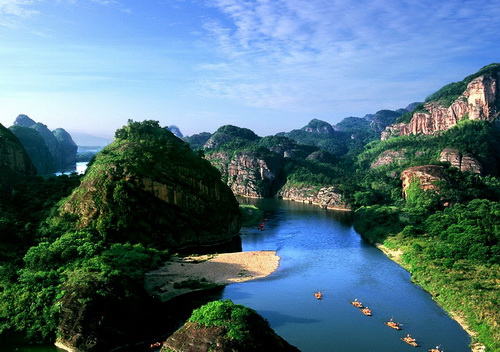 |
| Celestial Water Drifting |
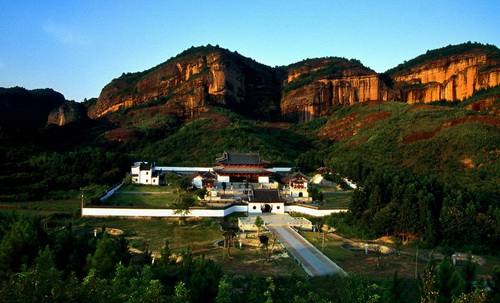 |
| Zhengyi Taoist Temple |





 Admission ticket price:
Admission ticket price: Drifting ticket price:
Drifting ticket price:  Tel:
Tel:  Website:
Website: